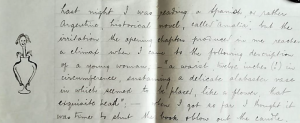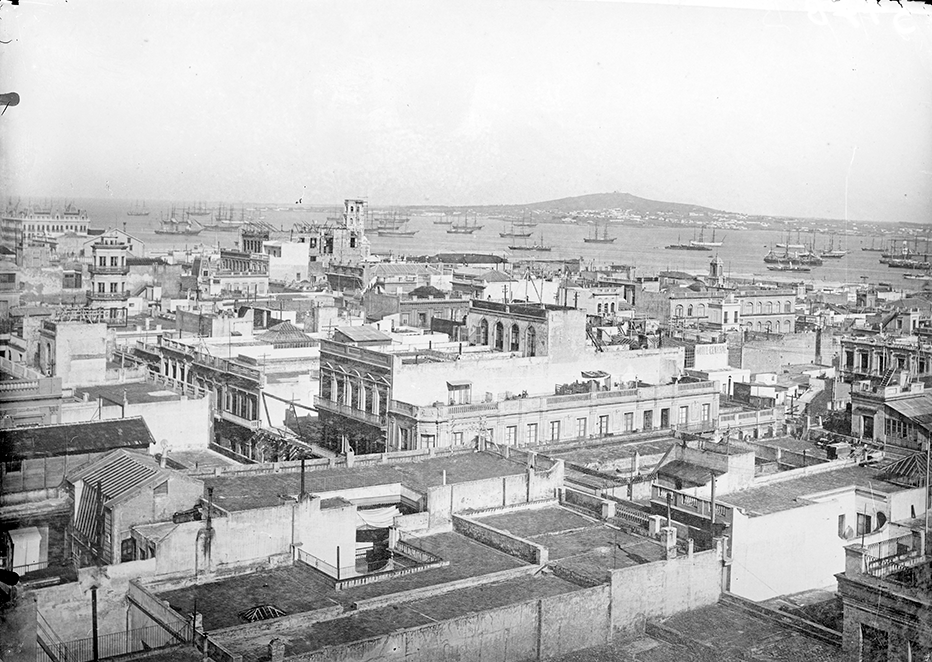59
18921113 See an image of this letter, http://dx.doi.org/10.17613/ev9d-7d81
(Buenos) Montevideo 13th Nov. 1892
My dear Mother,
Having headed so many letters “Buenos Aires” during the last three months the force of habit made me begin this one with a capital B.
But I am glad at having at last said adios to the Argentine, – though I must return for a couple days at the end of the week to bid it a final farewell. Not that Buenos Aires is at all a bad kind of place to live in, – quite the contrary, particularly when one has a sufficiently large circle of acquaintances. But the restless spirit awakes again & makes me wish to “move on”, – the effect of this wandering life. And I feel a kind of satisfaction in having “done” so much – finished a certain part of my journey – so that I can figuratively fold it up, write the name & date on the back, & put it away like an answered letter. I wonder does everyone experience that satisfaction of completion, the agreeableness of drawing a line through a reminder in one’s note-book, – of reading the last page of a heavy book undertaken from a sort of sense of duty – of placing in definite & final order things that have lain in pending confusion in one’s mind or in one’s surroundings. This is, as Basil used to say, a line of thought that might be followed out, but I won’t inflict on you any further reflections on the subject.
Last night I was reading a Spanish, or rather Argentine, historical novel, called “Amalia”, but the irritation the opening chapters produced in me reached a climax when I came to the following description of a young woman, – “a waist twelve inches (!) in circumference, sustaining a delicate alabaster vase in which seemed to be placed, like a flower, that exquisite head”; – when I got so far I thought it was time to shut the book & blow out the candle.[1]

One of the characters, an old schoolmaster, makes the observation that it is the stupidest pupils who write the best hand, – the dunces, as some do, should add carelessness to their stupidity & scrawl, & imagine themselves geniuses in consequence.
Something similar applies to a good many books. Because genius is sometimes eccentric not a few authors seem to think that is sufficient to be eccentric in order to be a genius. I am thinking just now of two shining lights but I am afraid to mention them lest I should be indignantly crushed by young ladies who have the advantage of attending lectures on literature. Ruskin is not one of them. I have a humble & enthusiastic admiration for him.
I have just read “Armorel of Lyonesse” by Besant, – a pretty story.[2] I like all Besant’s books. They are very weak in places, but the man is “motived” by right principles, & his work is good, if not so good as it might be. A Ruskinian theory applies here, but as it rather savours of moralizing I will merely refer you to Ruskin for it. I like the humour in the book; – there is not too much of it this time (as there is in the “The Golden Butterfly”).[3] There is a funny reference to a royal duke who used to murmur, during the weekly repetition of the commandments: “Never did that! Never did that!”
16th Nov. Last Sunday afternoon I drove out to the very pretty country residence of Mr Alfred Thomsen (of Hamburg & Montevideo) father of our local agent. It is a drive of about an hour, in the course of which one has many a fine view over the broad bay & the scythe-like promontory on which the town is built, & up the slopes which culminate in the well-known “Cerro”, a hill a few hundred feet high, referred to in the aforementioned historical novel as “that immense mountain!”[4]

Mr Thomsen’s house stands in some 150 squares of land, say, at a rough guess, 200 acres, most of which is covered with trees 30 to 40 years old, – oaks, firs, cedars, magnolias, & eucalyptus, a very beautiful property in this almost treeless land. It is alive with birds, for Mr Thomsen allows no shooting in the place, & is very angry if anyone injures bird or animal. He has five sons & one daughter. The second son fell from his horse nearly two years ago & injured his spine & is now a helpless invalid. It is very sad. He was formerly the strongest & most active of the family & he now has to be wheeled about on a couch & cannot walk a step.[5]
The two younger boys, sturdy chaps of about 8 & 10 years, were galloping about all afternoon on horseback, without stirrups, saddle, or other bridle than a rope fastened to the bit – the horses quite barebacked! I believe the little girl, who must be about 9 years old, rides like her brothers, sitting crossways like them. They run about the place barefooted, as their father believes in making them hardy & strong. They all rise at half past five & have their cold bath, & at eight o’clock they are in town after their hour’s drive – the father & eldest son at business, & the three young people at school. The youngest boy, aged 6, & the invalid, remain at the country-house.
This morning early I had a plunge in a fine saltwater swimming bath & another before dinner, – very refreshing now that the weather begins to get warm.
I shall have no letters from you now till I arrive at Rio. You can address there per return c/o Mr A. Spann, Caixa No 1.[6] In my next I shall likely give you another address.
Best love to all
Jack
- Amalia is a 19th-century political novel written by the exiled Argentine author José Mármol. First published serially in the Montevideo weekly, Amalia (1851) is a semi-autobiographical account of the experience of living under a dictatorship. https://en.wikipedia.org/wiki/Amalia_(novel) ↵
- Sir Walter Besant (b 14 August 1836, d 9 June 1901) was an English novelist and historian: https://en.wikipedia.org/wiki/Walter_Besant ↵
- The Golden Butterfly by Walter Besant and James Rice: https://www.gutenberg.org/files/43442/43442-h/43442-h.htm and https://www.bartleby.com/library/readersdigest/855.html ↵
- The Cerro de Montevideo is a hill located next to the city of Montevideo and the coast of the Montevideo Bay in Uruguay. With an altitude of 132 meters above sea level, it was the place chosen by the Spanish soldier Bruno Mauricio de Zabala for the installation of a surveillance post protecting the port of Montevideo against maritime invasions: https://es.wikipedia.org/wiki/Cerro_de_Montevideo ↵
- Alfred Thomsen (b 1843 Hamburg, d 1924 Buenos Aires). Sons: (1) Alfred Thomas Thomsen (b 1873) – would only have been 19 in 1892 – could he have been the agent?; (2) Emile (Emilio) Frederico Thomsen (b 1874, died 1893) - could he have been the “invalid”?; (3) Arturo Ricardo (b 1878); (4) Otto Hugh (b 1883) - he would have been around 10 in 1892; (5) Ervin Carlos (b 1887) - would have been 6. ↵
- Adolf Spann & Co was an “external” agent, a role described by Teresa da Silva Lopes et al. (2017) in their article "The 'disguised' foreign investor: Brands, trademarks and the British expatriate entrepreneur in Brazil," Business History 60(4):1-25: http://dx.doi.org/10.1080/00076791.2017.1287174 ↵
